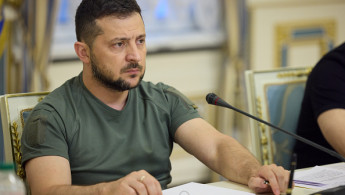Zelensky meets IAEA team over nuclear plant as fighting rages in southern Ukraine
President Volodymyr Zelensky met with top UN nuclear inspectors in Kyiv Tuesday ahead of their visit to inspect the Russian-occupied Zaporizhzhia nuclear plant as intense fighting raged across southern Ukraine, his office said.
International Atomic Energy Agency (IAEA) chief Rafael Grossi arrived in Kyiv late Monday at the head of a 14-strong team ahead of a visit to the Zaporizhzhia plant - Europe's largest atomic facility - which has been occupied by Russian troops since early March.
"This is probably one of the top-priority questions regarding safety of Ukraine and the world today," Zelensky said, calling for the "immediate de-militarisation of the plant" and its transfer to "full Ukrainian control".
The plant was targeted over the weekend by fresh shelling, Ukraine's nuclear agency Energoatom said, with Moscow and Kyiv trading blame for attacks around the complex of six nuclear reactors located on the banks of the Dnipro River.
Meanwhile, intensive fighting raged across the nearby southern region of Kherson as Ukrainian troops pressed a major counter-offensive "in various directions".
Most of the region of Kherson bordering the Black Sea - and its provincial capital of the same name - were seized by Moscow's military at the start of the invasion six months ago.
With the war in the eastern Donbas region largely stalled, analysts have said for weeks that combat is likely to shift south to break the stalemate before winter comes.
Also Tuesday, fresh Russian strikes on the centre of northeastern city of Kharkiv killed at least five people and injured seven.
But much of the attention remained on the counter-offensive in the south.
"Heavy fighting is taking place in almost the entire territory of the Kherson region," the president's office in Kyiv said in a morning update after a night of "powerful explosions" with its forces launching "offensive actions in various directions".
In Bereznehuvate, a town near the frontline some 70 kilometres (43 miles) north of Kherson city, AFP reporters could hear artillery fire and saw soldiers resting by the roadside.
"We forced them well back," said Victor, an infantryman in his 60s who declined to give a surname.
But his commander Oleksandr - a veteran of the Afghanistan war - predicted the fight to retake Kherson will be "long and complicated".
Russia's defence ministry claimed Tuesday that Ukraine had met "defeat" in its southern counterattack, suffering "large-scale losses" of more than 1,200 soldiers and some 150 military vehicles.
In a memo early Tuesday, Britain's defence ministry said that since the start of August, Russia had made "significant efforts" to reinforce troops on the western bank of the Dnipro River which splits Kherson city.
But "most of the units around Kherson are likely under-manned and are reliant upon fragile supply lines by ferry and pontoon bridges across the Dnipro," it said.
It was "not yet possible to confirm the extent of Ukrainian advances," it added.
The Ukrainian presidency claimed its forces had destroyed "almost all large bridges" over the Dnipro and that "only pedestrian crossings remain" in Kherson region.
Overnight, the Ukrainian-held city of Mykolaiv, 80 kilometres (50 miles) northwest of Kherson, came under "massive bombardment" with Russian anti-aircraft missiles killing two civilians and injuring 24, the army's southern command said.
The fresh fighting came as students across Ukraine prepared for the start of a new academic year after schools were shut by the Russian invasion, now in its seventh month.
Only those schools with air-raid bunkers will be permitted to reopen, with the rest reverting to online learning.
"We just want to live our life fully," 16-year-old student Polina told AFP in Kyiv.
"We are not afraid, we have already lived enough. Our generation has decided to live in the present moment."
Meanwhile, EU defence ministers meeting in Prague started work on plans for the bloc to train Ukrainian soldiers.
"There are many training initiatives but the needs are enormous," said EU foreign policy chief Josep Borrell, who says Ukrainian troops could be trained in nearby EU member states.





 Follow the Middle East's top stories in English at The New Arab on Google News
Follow the Middle East's top stories in English at The New Arab on Google News


